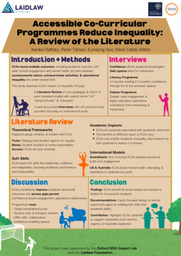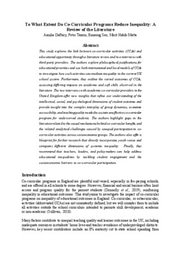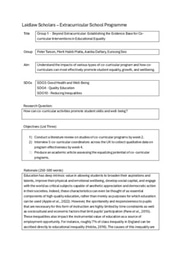Reflection on Week 5/1st year Laidlaw Oxford
Dear Community,
In the last two weeks, we have written and edited our literature review, and finally conducted two interviews with staff from notable extracurricular providers in nearby schools. I’ve felt very nervous about editing my lit review section down to the appropriate length, because pedagogical theory is a very challenging topic to simplify or prune, but my group’s supervisor, Ben Margetts, has had helpful feedback for us. Our interviews went extremely smoothly, even though we had hoped we would find more willing providers. They were able to remain focused on the topic and offer new insights in a casual, responsive format, which has made the analysis relatively straightforward. I am using NVivo to code different topics for easier comparison, as well as a word-cloud to add visual variety to our paper. One surprising result for me was that none of the interview subjects thought that societal power dynamics had especially significant impacts on how enrolled students treat one another, and both of them thought that their program had a positive impact on social integration, tolerance, and relational confidence for marginalized communities, even across levels of ability and experience. This contrasts strongly with the Freirean concern about societal hierarchies reproducing themselves in most educational settings, and equally with the Scrutonian claim that social hierarchies ought to be reproduced in education, albeit mediated by behavior evaluations that serve as a proxy for social position. I’m excited to write up my results on this and try to consider what about these programs’ structures produced this unusual result.
I’ve had a great time getting to know my fellow Laidlaw Scholars as well. I’ve gone on tours of more colleges this week than in my entire Michaelmas term last year, I volunteered at Turl Street Homeless Action with a peer from the program, and just yesterday I went to a potluck where we all discussed our projects and their prospects from our differing perspectives. I particularly enjoyed listening to and participating in a discussion of character that compared vastly different frameworks for addressing social inequality, weighing the potential systemic cooptation of purely individual character frameworks against the potential vagueness or risk of groupthink in a purely politicized and collective approach to leadership training. I felt so lucky to be part of this community where we can address these issues constructively.
One of the main things I’m hoping to achieve before the end of the summer is offering a clear and specific recommendation for future research by clarifying the connection between educational theory and specific extracurricular programs or criteria for evaluating them, which is a major lacuna in the research my group has looked at.
Best,
Peter



Please sign in
If you are a registered user on Laidlaw Scholars Network, please sign in